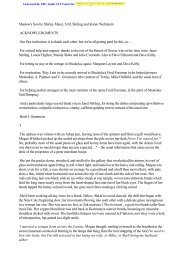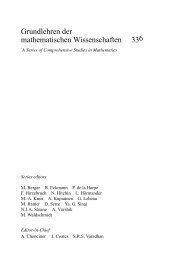- Page 1 and 2: POSITIVE OPERATORS
- Page 3 and 4: A C.I.P. Catalogue record for this
- Page 5 and 6: Contents Foreword ix Historical For
- Page 7: Foreword This monograph is a reprin
- Page 11 and 12: xiv Preface The material has been s
- Page 13 and 14: List of Special Symbols Numbers tha
- Page 15 and 16: List of Special Symbols xix w ∗ W
- Page 17 and 18: 2 1. The Order Structure of Positiv
- Page 19 and 20: 4 1. The Order Structure of Positiv
- Page 21 and 22: 6 1. The Order Structure of Positiv
- Page 23 and 24: 8 1. The Order Structure of Positiv
- Page 25 and 26: 10 1. The Order Structure of Positi
- Page 27 and 28: 12 1. The Order Structure of Positi
- Page 29 and 30: 14 1. The Order Structure of Positi
- Page 31 and 32: 16 1. The Order Structure of Positi
- Page 33 and 34: 18 1. The Order Structure of Positi
- Page 35 and 36: 20 1. The Order Structure of Positi
- Page 37 and 38: 22 1. The Order Structure of Positi
- Page 39 and 40: 24 1. The Order Structure of Positi
- Page 41 and 42: 26 1. The Order Structure of Positi
- Page 43 and 44: 28 1. The Order Structure of Positi
- Page 45 and 46: 30 1. The Order Structure of Positi
- Page 47 and 48: 32 1. The Order Structure of Positi
- Page 49 and 50: 34 1. The Order Structure of Positi
- Page 51 and 52: 36 1. The Order Structure of Positi
- Page 53 and 54: 38 1. The Order Structure of Positi
- Page 55 and 56: 40 1. The Order Structure of Positi
- Page 57 and 58: 42 1. The Order Structure of Positi
- Page 59 and 60:
44 1. The Order Structure of Positi
- Page 61 and 62:
46 1. The Order Structure of Positi
- Page 63 and 64:
48 1. The Order Structure of Positi
- Page 65 and 66:
50 1. The Order Structure of Positi
- Page 67 and 68:
52 1. The Order Structure of Positi
- Page 69 and 70:
54 1. The Order Structure of Positi
- Page 71 and 72:
56 1. The Order Structure of Positi
- Page 73 and 74:
58 1. The Order Structure of Positi
- Page 75 and 76:
60 1. The Order Structure of Positi
- Page 77 and 78:
62 1. The Order Structure of Positi
- Page 79 and 80:
64 1. The Order Structure of Positi
- Page 81 and 82:
66 1. The Order Structure of Positi
- Page 83 and 84:
68 1. The Order Structure of Positi
- Page 85 and 86:
70 1. The Order Structure of Positi
- Page 87 and 88:
72 1. The Order Structure of Positi
- Page 89 and 90:
74 1. The Order Structure of Positi
- Page 91 and 92:
76 1. The Order Structure of Positi
- Page 93 and 94:
Components, Homomorphisms, and Orth
- Page 95 and 96:
2.1. The Components of a Positive O
- Page 97 and 98:
2.1. The Components of a Positive O
- Page 99 and 100:
2.1. The Components of a Positive O
- Page 101 and 102:
2.1. The Components of a Positive O
- Page 103 and 104:
2.1. The Components of a Positive O
- Page 105 and 106:
2.1. The Components of a Positive O
- Page 107 and 108:
2.2. Lattice Homomorphisms 93 2.2.
- Page 109 and 110:
2.2. Lattice Homomorphisms 95 opera
- Page 111 and 112:
2.2. Lattice Homomorphisms 97 Proof
- Page 113 and 114:
2.2. Lattice Homomorphisms 99 Theor
- Page 115 and 116:
2.2. Lattice Homomorphisms 101 Proo
- Page 117 and 118:
2.2. Lattice Homomorphisms 103 comp
- Page 119 and 120:
2.2. Lattice Homomorphisms 105 Proo
- Page 121 and 122:
2.2. Lattice Homomorphisms 107 comp
- Page 123 and 124:
2.2. Lattice Homomorphisms 109 (2)
- Page 125 and 126:
2.3. Orthomorphisms 111 (e) Present
- Page 127 and 128:
2.3. Orthomorphisms 113 T (y) ∈ B
- Page 129 and 130:
2.3. Orthomorphisms 115 Proof. Let
- Page 131 and 132:
2.3. Orthomorphisms 117 The disjoin
- Page 133 and 134:
2.3. Orthomorphisms 119 defines an
- Page 135 and 136:
2.3. Orthomorphisms 121 follows fro
- Page 137 and 138:
2.3. Orthomorphisms 123 case we hav
- Page 139 and 140:
2.3. Orthomorphisms 125 Proof. We c
- Page 141 and 142:
2.3. Orthomorphisms 127 be identifi
- Page 143 and 144:
2.3. Orthomorphisms 129 is R X . By
- Page 145 and 146:
2.3. Orthomorphisms 131 6. Let (P)
- Page 147 and 148:
Chapter 3 Topological Consideration
- Page 149 and 150:
3.1. Topological Vector Spaces 135
- Page 151 and 152:
3.1. Topological Vector Spaces 137
- Page 153 and 154:
3.1. Topological Vector Spaces 139
- Page 155 and 156:
3.1. Topological Vector Spaces 141
- Page 157 and 158:
3.1. Topological Vector Spaces 143
- Page 159 and 160:
3.1. Topological Vector Spaces 145
- Page 161 and 162:
3.1. Topological Vector Spaces 147
- Page 163 and 164:
3.1. Topological Vector Spaces 149
- Page 165 and 166:
3.1. Topological Vector Spaces 151
- Page 167 and 168:
3.1. Topological Vector Spaces 153
- Page 169 and 170:
3.1. Topological Vector Spaces 155
- Page 171 and 172:
3.2. Weak Topologies on Banach Spac
- Page 173 and 174:
3.2. Weak Topologies on Banach Spac
- Page 175 and 176:
3.2. Weak Topologies on Banach Spac
- Page 177 and 178:
3.2. Weak Topologies on Banach Spac
- Page 179 and 180:
3.2. Weak Topologies on Banach Spac
- Page 181 and 182:
3.2. Weak Topologies on Banach Spac
- Page 183 and 184:
3.3. Locally Convex-Solid Riesz Spa
- Page 185 and 186:
3.3. Locally Convex-Solid Riesz Spa
- Page 187 and 188:
3.3. Locally Convex-Solid Riesz Spa
- Page 189 and 190:
3.3. Locally Convex-Solid Riesz Spa
- Page 191 and 192:
3.3. Locally Convex-Solid Riesz Spa
- Page 193 and 194:
3.3. Locally Convex-Solid Riesz Spa
- Page 195 and 196:
Banach Lattices Chapter 4 It is wel
- Page 197 and 198:
4.1. Banach Lattices with Order Con
- Page 199 and 200:
4.1. Banach Lattices with Order Con
- Page 201 and 202:
4.1. Banach Lattices with Order Con
- Page 203 and 204:
4.1. Banach Lattices with Order Con
- Page 205 and 206:
4.1. Banach Lattices with Order Con
- Page 207 and 208:
4.1. Banach Lattices with Order Con
- Page 209 and 210:
4.1. Banach Lattices with Order Con
- Page 211 and 212:
4.1. Banach Lattices with Order Con
- Page 213 and 214:
4.1. Banach Lattices with Order Con
- Page 215 and 216:
4.1. Banach Lattices with Order Con
- Page 217 and 218:
4.1. Banach Lattices with Order Con
- Page 219 and 220:
4.1. Banach Lattices with Order Con
- Page 221 and 222:
4.2. Weak Compactness in Banach Lat
- Page 223 and 224:
4.2. Weak Compactness in Banach Lat
- Page 225 and 226:
4.2. Weak Compactness in Banach Lat
- Page 227 and 228:
4.2. Weak Compactness in Banach Lat
- Page 229 and 230:
4.2. Weak Compactness in Banach Lat
- Page 231 and 232:
4.2. Weak Compactness in Banach Lat
- Page 233 and 234:
4.2. Weak Compactness in Banach Lat
- Page 235 and 236:
4.3. Embedding Banach Spaces 221 (a
- Page 237 and 238:
4.3. Embedding Banach Spaces 223 th
- Page 239 and 240:
4.3. Embedding Banach Spaces 225 (3
- Page 241 and 242:
4.3. Embedding Banach Spaces 227 th
- Page 243 and 244:
4.3. Embedding Banach Spaces 229 (b
- Page 245 and 246:
4.3. Embedding Banach Spaces 231 Th
- Page 247 and 248:
4.3. Embedding Banach Spaces 233 It
- Page 249 and 250:
4.3. Embedding Banach Spaces 235 (1
- Page 251 and 252:
4.3. Embedding Banach Spaces 237 ˙
- Page 253 and 254:
4.3. Embedding Banach Spaces 239 C
- Page 255 and 256:
4.3. Embedding Banach Spaces 241 Pr
- Page 257 and 258:
4.3. Embedding Banach Spaces 243 ho
- Page 259 and 260:
4.3. Embedding Banach Spaces 245 In
- Page 261 and 262:
4.3. Embedding Banach Spaces 247 Le
- Page 263 and 264:
4.3. Embedding Banach Spaces 249 ST
- Page 265 and 266:
4.3. Embedding Banach Spaces 251 co
- Page 267 and 268:
4.3. Embedding Banach Spaces 253 Th
- Page 269 and 270:
4.4. Banach Lattices of Operators 2
- Page 271 and 272:
4.4. Banach Lattices of Operators 2
- Page 273 and 274:
4.4. Banach Lattices of Operators 2
- Page 275 and 276:
4.4. Banach Lattices of Operators 2
- Page 277 and 278:
4.4. Banach Lattices of Operators 2
- Page 279 and 280:
4.4. Banach Lattices of Operators 2
- Page 281 and 282:
4.4. Banach Lattices of Operators 2
- Page 283 and 284:
4.4. Banach Lattices of Operators 2
- Page 285 and 286:
4.4. Banach Lattices of Operators 2
- Page 287 and 288:
Compactness Properties of Positive
- Page 289 and 290:
5.1. Compact Operators 275 An opera
- Page 291 and 292:
5.1. Compact Operators 277 Proof. L
- Page 293 and 294:
5.1. Compact Operators 279 holds fo
- Page 295 and 296:
5.1. Compact Operators 281 simplici
- Page 297 and 298:
5.1. Compact Operators 283 To this
- Page 299 and 300:
5.1. Compact Operators 285 and S2(
- Page 301 and 302:
5.1. Compact Operators 287 “roots
- Page 303 and 304:
5.1. Compact Operators 289 10. (Loz
- Page 305 and 306:
5.2. Weakly Compact Operators 291 (
- Page 307 and 308:
5.2. Weakly Compact Operators 293 d
- Page 309 and 310:
5.2. Weakly Compact Operators 295 P
- Page 311 and 312:
5.2. Weakly Compact Operators 297 N
- Page 313 and 314:
5.2. Weakly Compact Operators 299 T
- Page 315 and 316:
5.2. Weakly Compact Operators 301 s
- Page 317 and 318:
5.2. Weakly Compact Operators 303 F
- Page 319 and 320:
5.2. Weakly Compact Operators 305 a
- Page 321 and 322:
5.2. Weakly Compact Operators 307 J
- Page 323 and 324:
5.2. Weakly Compact Operators 309 b
- Page 325 and 326:
5.2. Weakly Compact Operators 311 U
- Page 327 and 328:
5.2. Weakly Compact Operators 313 (
- Page 329 and 330:
5.2. Weakly Compact Operators 315 w
- Page 331 and 332:
5.3. L-and M-weakly Compact Operato
- Page 333 and 334:
5.3. L-and M-weakly Compact Operato
- Page 335 and 336:
5.3. L-and M-weakly Compact Operato
- Page 337 and 338:
5.3. L-and M-weakly Compact Operato
- Page 339 and 340:
5.3. L-and M-weakly Compact Operato
- Page 341 and 342:
5.3. L-and M-weakly Compact Operato
- Page 343 and 344:
5.3. L-and M-weakly Compact Operato
- Page 345 and 346:
5.3. L-and M-weakly Compact Operato
- Page 347 and 348:
5.3. L-and M-weakly Compact Operato
- Page 349 and 350:
5.3. L-and M-weakly Compact Operato
- Page 351 and 352:
5.3. L-and M-weakly Compact Operato
- Page 353 and 354:
5.3. L-and M-weakly Compact Operato
- Page 355 and 356:
5.4. Dunford-Pettis Operators 341 T
- Page 357 and 358:
5.4. Dunford-Pettis Operators 343 t
- Page 359 and 360:
5.4. Dunford-Pettis Operators 345 w
- Page 361 and 362:
5.4. Dunford-Pettis Operators 347 P
- Page 363 and 364:
5.4. Dunford-Pettis Operators 349 N
- Page 365 and 366:
5.4. Dunford-Pettis Operators 351 y
- Page 367 and 368:
5.4. Dunford-Pettis Operators 353 N
- Page 369 and 370:
5.4. Dunford-Pettis Operators 355 c
- Page 371 and 372:
5.4. Dunford-Pettis Operators 357 1
- Page 373 and 374:
360 Bibliography 15. C. D. Aliprant
- Page 375 and 376:
362 Bibliography 61. P. Enflo, A co
- Page 377 and 378:
364 Bibliography 104. M. G. Krein a
- Page 379 and 380:
366 Bibliography 144. L. C. Moore,
- Page 381 and 382:
368 Bibliography 188. A. I. Veksler
- Page 383 and 384:
Index AL-space, 194 AM-space, 193,
- Page 385 and 386:
Index 373 supporting, 138 gauge, 13
- Page 387 and 388:
Index 375 projection band, 35 proje
















